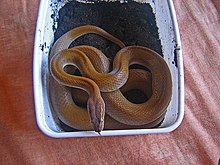Lamprophiinae
| Lamprophiinae | |
|---|---|
 | |
| Boaedon capensis | |
| Scientific classification | |
| Domain: | Eukaryota |
| Kingdom: | Animalia |
| Phylum: | Chordata |
| Class: | Reptilia |
| Order: | Squamata |
| Suborder: | Serpentes |
| Family: | Lamprophiidae |
| Subfamily: | Lamprophiinae Fitzinger, 1843 |
| Genera | |
| 12, see text | |
Lamprophiinae is a subfamily of lamprophiid snakes, a large group of mostly African snakes, most of which were formerly classified as colubrids but which we now know are actually more closely related to elapids.[1][2][3][4][5][6]
Lamprophiine snakes are small to medium-sized snakes, several of which use constriction to subdue their prey. In general we know little about their ecology in the wild.
The best-known lamprophiines are probably the genera Boaedon and Lamprophis, commonly known as "house snakes". Several species are popular in the pet trade.
Chamaelycus and Dendrolycus are the most poorly known genera.[7]
Genera
[edit]There are currently 78 species in 15 genera placed in Lamprophiinae.[8]
- Alopecion Duméril, 1853 - spotted house snake
- Boaedon A.M.C. Duméril, Bibron & A.H.A. Duméril, 1854 (brown house snakes)
- Bothrolycus Günther, 1874 (Günther's black snake)
- Bothrophthalmus W. Peters, 1863 (red-black striped snakes)
- Chamaelycus Boulenger, 1919 (African banded snakes)
- Dendrolycus Laurent, 1956 (Cameroon rainforest snake)
- Gonionotophis Boulenger, 1893 (African File Snakes; including the former genus Mehelya)
- Gracililima Broadley, Tolley, Conradie, Wishart, Trape, Burger, Kusamba, Zassi-Boulou & Greenbaum, 2018 (black file snake)
- Hormonotus Hallowell, 1857 (yellow forest snake)
- Inyoka Kelly, Branch, Broadley, Barker & Villet, 2011 (Swazi rock snake)
- Lamprophis Fitzinger, 1843 (dwarf house snakes)
- Limaformosa Broadley, Tolley, Conradie, Wishart, Trape, Burger, Kusamba, Zassi-Boulou, & Greenbaum, 2018(African file snakes; including the former genus Mehelya)
- Lycodonomorphus Fitzinger, 1843 (African water snakes)
- Lycophidion Fitzinger, 1843 (African wolf snakes)
- Pseudoboodon Peracca, 1897 (Ethiopian mountain snakes)
References
[edit]Wikimedia Commons has media related to Lamprophiinae.
- ^ Pyron, R. Alexander; Burbrink, Frank T.; Colli, Guarino R.; de Oca, Adrian Nieto Montes; Vitt, Laurie J.; Kuczynski, Caitlin A.; Wiens, John J. (2011). "The phylogeny of advanced snakes (Colubroidea), with discovery of a new subfamily and comparison of support methods for likelihood trees" (PDF). Molecular Phylogenetics and Evolution. 58 (2): 329–342. doi:10.1016/j.ympev.2010.11.006. PMID 21074626. Archived from the original (PDF) on 2013-12-03.
- ^ Pyron, R. A.; Burbrink, F.; Wiens, J. J. (2013). "A phylogeny and revised classification of Squamata, including 4161 species of lizards and snakes". BMC Evolutionary Biology. 13: 93. doi:10.1186/1471-2148-13-93. PMC 3682911. PMID 23627680.
- ^ Streicher, J. W.; Ruane, S. (2018). "Phylogenomics of Snakes". eLS: 1–8. doi:10.1002/9780470015902.a0027476. ISBN 9780470015902.
- ^ Figueroa, A.; McKelvy, A. D.; Grismer, L. L.; Bell, C. D.; Lailvaux, S. P. (2016). "A species-level phylogeny of extant snakes with description of a new colubrid subfamily and genus". PLOS ONE. 11 (9): e0161070. Bibcode:2016PLoSO..1161070F. doi:10.1371/journal.pone.0161070. PMC 5014348. PMID 27603205.
- ^ Zheng, Y; Wiens, JJ (2016). "Combining phylogenomic and supermatrix approaches, and a time-calibrated phylogeny for squamate reptiles (lizards and snakes) based on 52 genes and 4162 species" (PDF). Molecular Phylogenetics and Evolution. 94 (Pt B): 537–547. doi:10.1016/j.ympev.2015.10.009. PMID 26475614.
- ^ Kelly, C. M. R.; Branch, W. R.; Broadley, D. G.; Barker, N. P.; Villet, M. H. (2011). "Molecular systematics of the African snake family Lamprophiidae Fitzinger, 1843 (Serpentes: Elapoidea), with particular focus on the genera Lamprophis Fitzinger 1843 and Mehelya Csiki 1903". Molecular Phylogenetics and Evolution. 58 (3): 415–426. doi:10.1016/j.ympev.2010.11.010. PMID 21095234.
- ^ de Witte, G. F. (1963). "The colubrid snake genera Chamaelycus Boulenger and Oophilositum Parker". Copeia. 1963 (4): 634–636. doi:10.2307/1440964. JSTOR 1440964.
- ^ "Lamprophiinae". Reptile Database. Retrieved 22 May 2018.


 French
French Deutsch
Deutsch